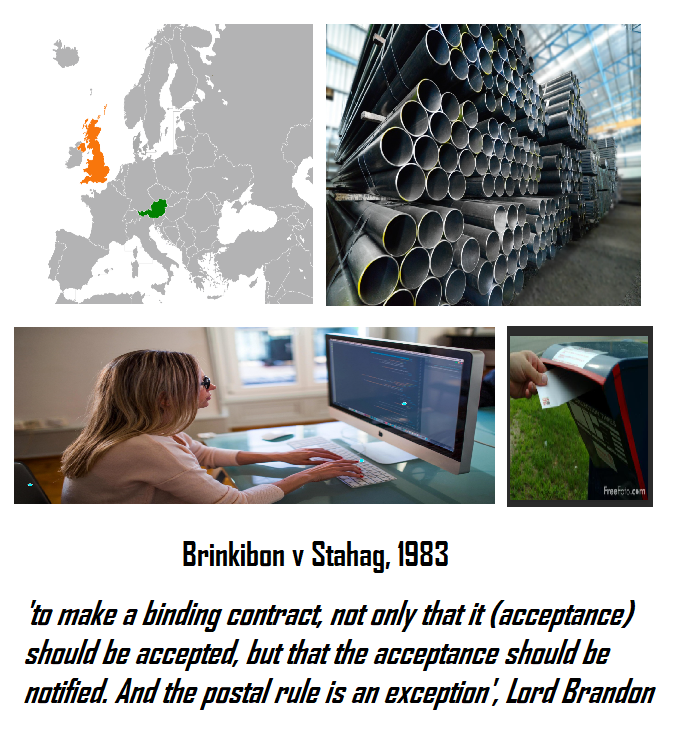Brinkibon Ltd v Stahag Stahl [1983] 2 AC 34
Citation:Brinkibon Ltd v Stahag Stahl [1983] 2 AC 34
Rule of thumb:In electronic communications between 2 countries, in which country is the contract finalised? Contract law from what country applies? A contract is concluded once the acceptance is actually read by the other party, and the contract is concluded in the location the acceptance is read.
Background facts:
The basic facts were that Brinkibon was a London company involved in industry and Stahag was an Austrian company selling steel. Stahag made an offer to Brinkibon and Brinkibon sent the acceptance to Stahag in Austria via a fax machine. A dispute arose between the parties. Stahag raised a Court action in the Austrian Courts and sent this to Brinkibon.
Parties argued:
Brininbon argued that the writ was invalid because it was citing Austrian law when it should have been citing UK law as this was where the contract was formed. Brinkibon argued that once they sent the fax accepting the contract was finalised meaning this contract was therefore finalised in the UK. Stahag argued that the contract was concluded in Austria because this was where the acceptance of the contract was read - arguing that the contract was only finalised when acceptane was actually read - and this was therefore where it was finalised.
Judgment:
The Court upheld the arguments of Stahag and agreed that the contract was ony finalised when the acceptance was read meaning that it was formed in Austria. The Court clarified however that the postal rule would remain an exception to this. Namely, if Brinkibon had posted rather than faxed their acceptance then the contract would have been formed in the UK.

Ratio-decidendi:
'Unquestionably, as a general proposition, when an offer is made, it is necessary in order to make a binding contract, not only that it should be accepted, but that the acceptance should be notified.’ And the postal rule is an exception based on ‘commercial expediency… more convenient, and makes on the whole for greater fairness, than the general rule itself would do', Lord Brandon
Warning: This is not professional legal advice. This is not professional legal education advice. Please obtain professional guidance before embarking on any legal course of action. This is just an interpretation of a Judgment by persons of legal insight & varying levels of legal specialism, experience & expertise. Please read the Judgment yourself and form your own interpretation of it with professional assistance.

